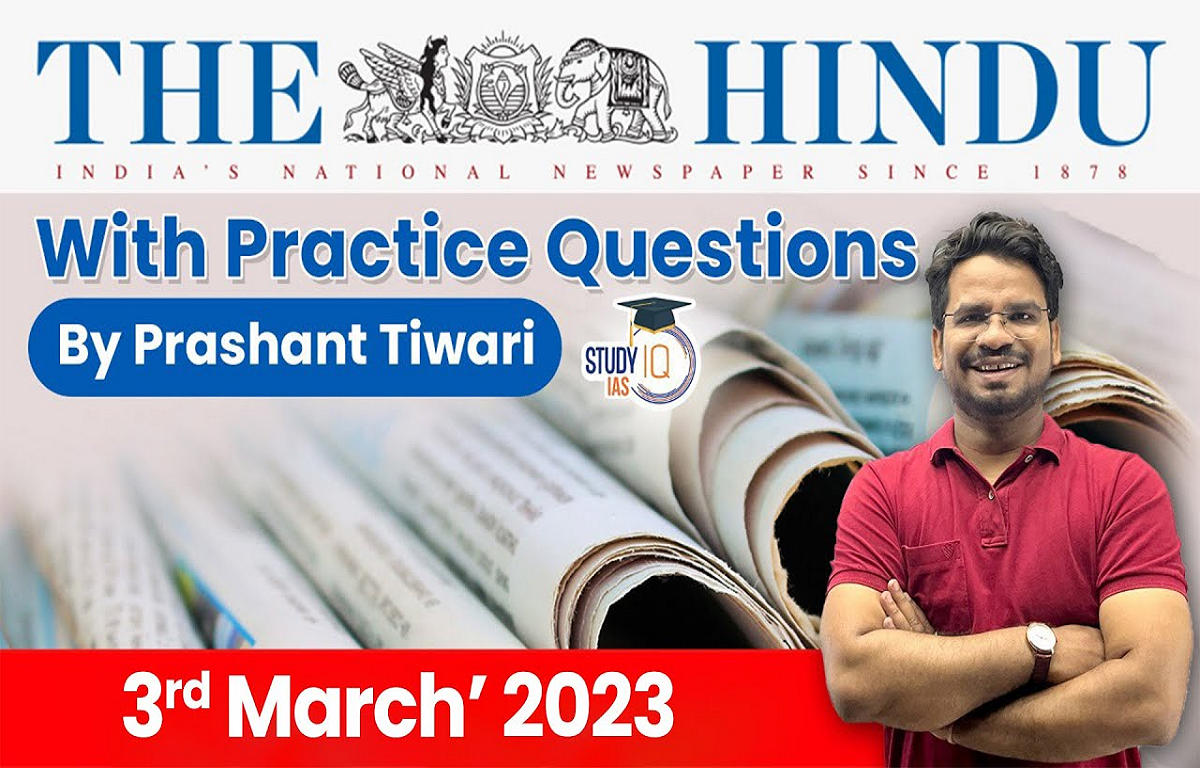The Hindu Newspaper Analysis for UPSC

The Hindu Newspaper Analysis 2 March 2023
- A Constitution Bench of the Supreme Court on Thursday directed in a landmark judgment that the Chief Election Commissioner (CEC) and Election Commissioners will be appointed by the President on the advice of a panel of the Prime Minister, Leader of the Opposition (LoP) in the Lok Sabha or the leader of the single largest party in Opposition and the Chief Justice of India (CJI).
- The court said “fierce independence, neutrality and honesty” envisaged in the institution of the Election Commission requires an end to government monopoly and “exclusive control” over appointments to the highest poll body.
- The President of India appoints the Chief Election Commissioner and Election Commissioners.
- They have tenure of six years, or up to the age of 65 years, whichever is earlier.
- They enjoy the same status and receive salary and perks as available to Judges of the Supreme Court of India.
- The Constitution is silent about the procedure for removal of the two Election Commissioners. It only provides for removal on the recommendation of the CEC.
- The Constitution has neither prescribed the qualification of the members of the ECI nor specified the terms of the members of the ECI.
- The Constitution has not debarred the retiring election commissioners from any further appointment by the government.

- The Telangana government has taken legal recourse for resolving its grievance against the delays in clearance of important Bills, passed by two Houses of the State Legislature, by the Governor’s office.
- The government has filed a petition in the Supreme Court claiming that the Telangana government is constrained to move before the court under its extraordinary jurisdiction conferred under Article 32 of the Constitution of India in view of “a very prequent constitutional impasse created on account of the refusal of the Governor to act on several Bills passed by the State Legislature.
- These Bills are pending since September 14, 2022 till date for the assent of the Governor”, the government said in its petition for which Governor Tamilisai Soundararajan has been made a respondent.
- The government has quoted Article 200 of the Constitution which mandates that the Governor could assent or could withhold assent in which case the Bill should be returned together with the message requesting that the Houses reconsider the Bill for any specified provision and would consider the desirability of introducing any such amendments as it might recommend in the message.
- By virtue of Article 163, the Governor was required to exercise his functions or any of them in his discretion only on the aid and advice of the Council of Ministers with the Chief Minister as its head.
- “The Governor is not expected to act independently and this position has been made amply clear by the Constitution Bench of the Supreme Court in Shamsher Singh Vs State of Punjab (1974)”, the government said.


- On February 23, 2023, on the eve of the first anniversary of Russia’s invasion of Ukraine, the United Nations General Assembly (UNGA) adopted a resolution, calling for an end to the war. The resolution was favoured by 141 members and opposed by seven, while 32 states abstained. Unsurprisingly, India was one among the 32.
- This is in line with the position India has been taking on the Ukraine crisis from the beginning. India has refused to condemn Russia for the invasion; it has refused to join the West’s sanctions; has stepped up buying Russian fuel at a discounted price, and has consistently abstained from UN votes on the war.
- India and South Africa, large democracies from Asia and Africa, have consistently abstained from votes at the UN and refused to join the sanctions — because the sanctions were unilateral, imposed by specific countries or blocs, without UN approval. Brazil, the largest democracy in South America, has not joined the sanctions; so have many smaller democracies (and non-democracies) across geographies.
- In other words, when there was a divergence between national interests and moral concepts, the West, without qualms, embraced the first. Then why should not emerging countries such as India put their national interest at the core of their policy making?
- Energy, Defence and China.

- South Asia’s people are its biggest asset but remain wastefully underutilised.
- With nearly half its population under the age of 24 and over one million young people set to enter the labour force every month until 2030, the region could reap an enviably high demographic dividend. But South Asia is also home to over one third of the world’s stunted children.
- And a child born in the region today can, by the age of 18, expect to attain only 48% of their full productive potential. If the quantity and quality of South Asia’s human capital were to improve, regional GDP per worker could double.
- Given the high returns to human capital, the huge losses inflicted by the pandemic, and the region’s vulnerability to a variety of shocks, even with constrained government budgets, scaling up these interventions should be a no brainer.
- Globally, countries that have systems in place to support individuals and families before a crisis strikes, can better protect their citizens during the crisis.

- The meeting in Delhi, which brought together the world’s 20 most-developed economies, saw sharp words exchanged by U.S. Secretary of State Antony Blinken, Russian Foreign Minister Sergey Lavrov and a number of other Foreign Ministers, despite an appeal from Prime Minister Narendra Modi at the start of the meeting to “rise above differences”.
























 WhatsApp
WhatsApp